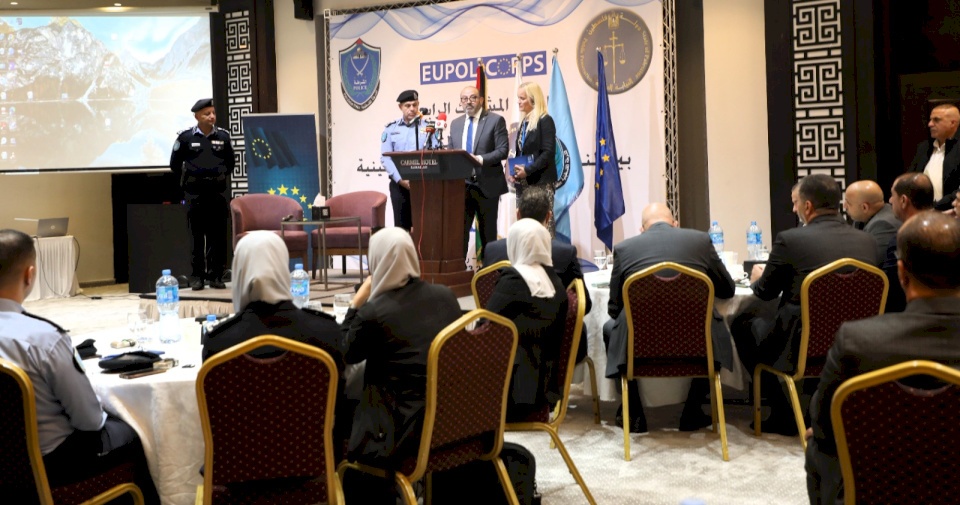
The Final Statement of the Fourth Joint Conference Between the Public Prosecution and the Palestinian Police
SadaNews - The Public Prosecution and the Palestinian Police concluded the work of the fourth joint conference held in Ramallah, attended by Attorney General Counselor Akram Al-Khatib, Director General of Police Major General Alaa Al-Saqa, and Head of the European Union Mission Karen Liemdal.
The conference objectively and professionally discussed the reality of emerging crimes, challenges of cross-border investigations, the role of media in raising community awareness and preserving the confidentiality of investigations, in addition to discussing a draft unified procedural guide in the evidence gathering phase in drug-related cases as a step towards unifying procedural paths on a national level. There was also a focus on enhancing oversight mechanisms for rehabilitation and correction centers and detention places, and developing forensic laboratories and judicial police to keep pace with the rapid advancements in crime patterns and the operational methods of law enforcement agencies.
The main results of the discussions and recommendations came in accordance with the following axes:
First: Enhancing international cooperation and combating cyber and transnational crimes through:
1. Developing a comprehensive national strategy to confront cyber, financial, and transnational crimes, identifying jurisdiction points and distributing roles among the relevant agencies.
2. Activating official and unofficial international cooperation channels, and utilizing the role of Interpol and international networks in tracking down criminals and recovering assets such as "MENA ARIN, Globe Network, Egmont Group, EMJ NET" due to the effectiveness of these networks in information exchange, whether automatically or upon request through the entity representing the State of Palestine.
3. Developing a unified procedural guide for preserving digital evidence and controlling devices, ensuring the integrity of the procedure and the digital rights of citizens.
4. Including specialized materials on international cooperation and cross-border investigations in the programs of the Palestinian Judicial Institute and police training units.
5. Studying the alignment of national legislation with relevant international agreements before making any amendments to the cybercrime law.
Second: Enhancing the role of media in raising community awareness and preserving the confidentiality of investigations through:-
1. Preparing a unified national protocol for publishing in criminal cases that preserves the confidentiality of investigations and the rights of the parties, enhancing citizen trust in the judicial institution.
2. Establishing accountability mechanisms to track sources of information leaks in sensitive cases.
3. Launching national awareness campaigns about regulated information and legal liability in publishing and circulation.
Third: The reality of oversight and inspection of rehabilitation centers and places of detention
1. Reviewing the criminal policy of penal legislation regarding alternatives to custodial sentences and reinforcing the concept of restorative justice, as well as studying the possibility of issuing a general amnesty for accumulated minor crimes and cases that have been ongoing for a long time.
2. Creating a specialized coordinating body between the public prosecution, police, and the Supreme Judicial Council in executing the recommendations of international committees related to the obligations of the State of Palestine under international agreements regarding human rights.
Fourth: Draft unified procedural guide in the evidence gathering phase in drug-related cases
1. Including all necessary guidelines in the unified procedural guide to conduct investigations and parallel financial inquiries in drug trafficking crimes, which facilitates:-
A. Identifying the scope of criminal networks and/or the scope of the crime.
B. Identifying and tracking criminal proceeds or any other assets that may be subject to seizure.
C. Developing evidence that can be used in criminal proceedings.
2. Conducting a comprehensive workshop to discuss the theoretical framework of the unified procedural guide.
3. Conducting written and oral consultations on the draft of the guide before its approval, and forming joint committees to follow up on the implementation of the guide.
4. Establishing a legal mechanism that ensures the protection of witnesses and informants (the undercover agent), similar to what is practiced in the Anti-Corruption Law.
Fifth: The role of the evidence management and forensic laboratories in enhancing criminal investigations.
1. The necessity of making the legislative amendments required regarding the acceptance of investigation results related to DNA and specifying its credibility, especially in cases where ordinary means of proof fail to establish them.
2. The necessity of providing judges and forensic investigators with specialized technical courses in handling modern scientific evidence professionally.
3. Forming a coordinating body to develop the forensic laboratory and supervise the quality and speed of services provided by it, consisting of "the Palestinian Police, the Ministry of Justice, the Public Prosecution, and the Supreme Judicial Council".
4. The necessity of including forensic medicine in the forensic laboratory due to the presence of experts in the examination of firearms and ammunition, and experts in toxicology, which will facilitate writing complete technical reports quickly, accurately, and with quality.
Sixth: Enhancing the role of the judicial police in executing memoranda and judicial rulings.
1. Forming a coordinating body among partner parties, "the Ministry of Interior, the General Directorate of Police, the Public Prosecution, and the Supreme Judicial Council," to coordinate work and dissolve obstacles.
2. Completing the electronic linkage process regarding criminal executions and judicial rulings.
The Public Prosecution and the Palestinian Police, while announcing this statement, affirm their commitment to transforming these recommendations into a joint executive plan executed on the ground, translated into practical procedures that enhance the rule of law, ensure the protection of rights, and solidify citizen trust in the national justice system.

Thousands Perform Friday Prayer at Al-Aqsa Mosque

Weather Conditions: A Low-Pressure System Accompanied by a Cold Air Mass

Journalists' Syndicate Condemns the Occupation's Continued Ban on Foreign Media Entry into...

Police: Investigation into the circumstances of a girl's death in Ramallah

Justice Minister meets UN Special Coordinator for the Peace Process in the Middle East

The Jerusalem House of Money Agency Equips Schools in the Jerusalem Suburbs with Various E...

Palestinian Health Ministry Issues Clarification Notice Regarding Infant Formula

